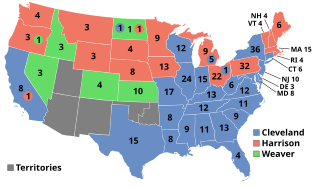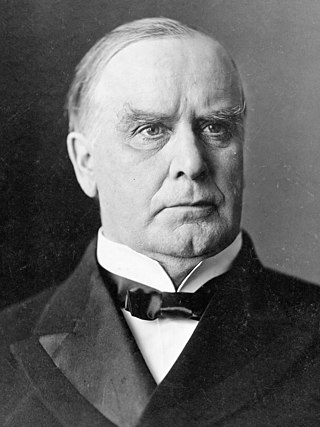
The 1892 United States presidential election was the 27th quadrennial presidential election,held on Tuesday,November 8,1892. In a rematch of the closely contested 1888 presidential election,former Democratic President Grover Cleveland defeated incumbent Republican President Benjamin Harrison. Cleveland's victory made him the first and,to date,the only person in American history to be elected to a non-consecutive second presidential term. It was also the first of two times incumbents were defeated in consecutive elections—the second being Jimmy Carter's defeat of Gerald Ford in 1976,followed by Carter's subsequent loss to Ronald Reagan in 1980. It was the first election since 1856 in which one former president ran against the incumbent president,an event not repeated until 1912.

The 1896 United States presidential election was the 28th quadrennial presidential election,held on Tuesday,November 3,1896. Former Governor William McKinley,the Republican nominee,defeated former Representative William Jennings Bryan,the Democratic nominee. The 1896 campaign,which took place during an economic depression known as the Panic of 1893,was a political realignment that ended the old Third Party System and began the Fourth Party System.

The 1900 United States presidential election was the 29th quadrennial presidential election,held on Tuesday,November 6,1900. In a re-match of the 1896 race,incumbent Republican President William McKinley defeated his Democratic challenger,William Jennings Bryan. McKinley's victory made him the first president to win a consecutive re-election since Ulysses S. Grant accomplished the same feat in 1872. Until 1956,this would be the last time in which an incumbent Republican president would win re-election after serving a full term in office. This election saw the fifth rematch in presidential history,something that would also not occur again until 1956. This was also the first rematch to produce the same winner both times.

The 1904 United States presidential election was the 30th quadrennial presidential election,held on Tuesday,November 8,1904. Incumbent Republican President Theodore Roosevelt defeated the conservative Democratic nominee,Alton B. Parker. Roosevelt's victory made him the first president who ascended to the presidency upon the death of his predecessor to win a full term in his own right. This was also the second presidential election in which both major party candidates were registered in the same home state;the others have been in 1860,1920,1940,1944,and 2016.

The 1908 United States presidential election was the 31st quadrennial presidential election,held on Tuesday,November 3,1908. Republican Party nominee William Howard Taft defeated three-time Democratic nominee William Jennings Bryan.

The People's Party,also known as the Populist Party or simply the Populists,was a left-wing agrarian populist political party in the United States in the late 19th century. The Populist Party emerged in the early 1890s as an important force in the Southern and Western United States,but collapsed after it nominated Democrat William Jennings Bryan in the 1896 United States presidential election. A rump faction of the party continued to operate into the first decade of the 20th century,but never matched the popularity of the party in the early 1890s.

The Prohibition Party is a political party in the United States known for its historic opposition to the sale or consumption of alcoholic beverages and as an integral part of the temperance movement. It is the oldest existing third party in the United States and the third-longest active party.

Marion Butler was an American politician,farmer,and lawyer. He represented North Carolina in the United States Senate for one term,serving between 1895 and 1901. At the time,he was a leader of the North Carolina Populist Party,and also affiliated with the Democratic Party and the Republican Party at different points in his career. He was the older brother of George Edwin Butler.

The Farmers' Alliance was an organized agrarian economic movement among American farmers that developed and flourished ca. 1875. The movement included several parallel but independent political organizations —the National Farmers' Alliance and Industrial Union among the white farmers of the South,the National Farmers' Alliance among the white and black farmers of the Midwest and High Plains,where the Granger movement had been strong,and the Colored Farmers' National Alliance and Cooperative Union, consisting of the African American farmers of the South.

The 51st United States Congress,referred to by some critics as the Billion Dollar Congress,was a meeting of the legislative branch of the United States federal government,consisting of the United States Senate and the United States House of Representatives. It met in Washington,D.C.,from March 4,1889,to March 4,1891,during the first two years of Benjamin Harrison's presidency.

Hale Johnson was an American attorney and politician who served as the Prohibition Party's vice presidential nominee in 1896 and ran for its presidential nomination in 1900.

William Alfred Peffer was a lawyer,Union Army officer during the American Civil War,state legislator,and United States Senator from Kansas. He was the first of six Populists elected to the United States Senate. In the Senate he was recognizable by his enormous flowing beard. His name was also raised as a possible third-party presidential candidate in 1896.

The 1904 Democratic National Convention was an American presidential nominating convention that ran from July 6 through 10 in the Coliseum of the St. Louis Exposition and Music Hall in St. Louis,Missouri. Breaking with eight years of control by the Democratic Party's reform wing,the convention nominated conservative Judge Alton B. Parker of New York for president and Henry G. Davis of West Virginia for vice president.

Charles E. Cunningham was an American politician who is best known for being the Union Labor Party's nominee for Vice President of the United States in the 1888 election.

Oliver Wayne Stewart was an American politician who served as the chairman of the Prohibition Party and in the Illinois state House of Representatives.
Fred G. Blood was a Populist member of the Illinois House of Representatives.

Hosea Hartwell Moore was an American medical doctor,farmer,and politician who served as a member of the Illinois House of Representatives from 1891 to 1893.

Cicero Jefferson Lindly (1857–1926) was an American politician and judge who served as a Republican member of the Illinois House of Representatives.

James Cockrell (1840-1917) was an American farmer and politician who served as a member of the Illinois House of Representatives during the 37th Illinois General Assembly.
The 1891 United States Senate election in Illinois was held from January 13 to March 11,1891. The contentious election was determined by a joint session of the Illinois General Assembly. The election went on for 154 ballots and cost the State of Illinois approximately $150,000.


















